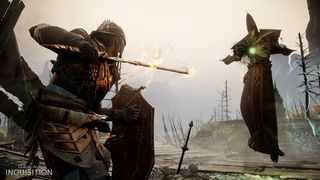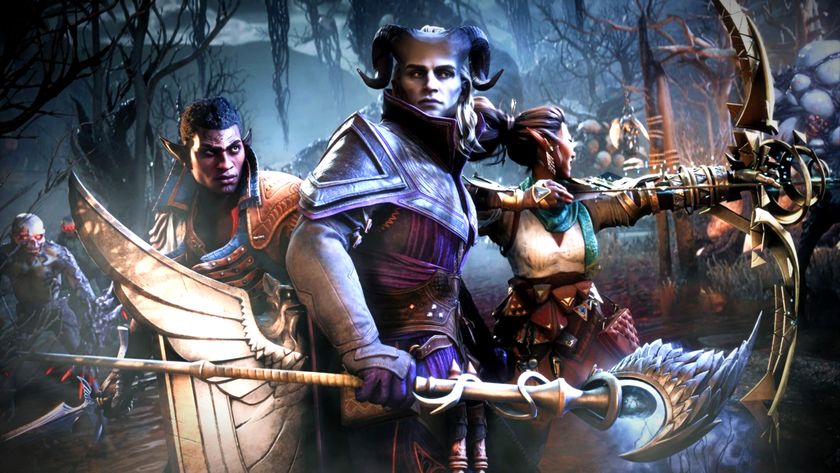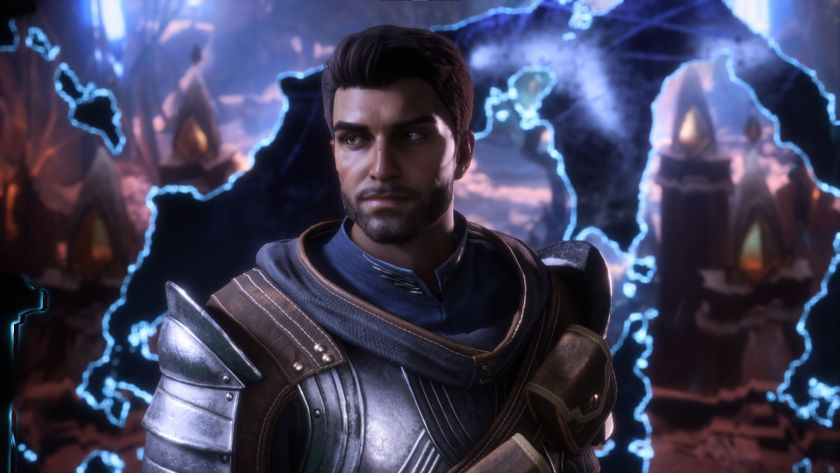You'll lose yourself in Dragon Age: Inquisition's fantastic storytelling
This week, we're highlighting the top five titles in our Game of the Year 2014 list. Dragon Age: Inquisition ranks at #2 - and here's Lorenzo Veloria's take on what makes it so awesome.
Where do I start with Dragon Age: Inquisition? When the game drops you into the first open area, the Hinterlands (which I'm sure some of you just can't seem to escape), there're just so many things to do. You can go off and explore the massive landscape in front of you, assisting all of the downtrodden and abused locals in the area. You can carry on lengthy conversations with even the most minor characters, each line of dialogue revealing more and more fascinating tidbits about that person's life and the realm of Thedas. Then there's the monsters to slay, armor to craft, items to collect, and books to read. The world feels endless - but more importantly, it's full of life.
Sure, other open-world games give you lots of quests to pursue and loot to horde, but Inquisition makes you feel like you're part of what's happening around you, not just some detached, prophesied savior making a beeline from one objective marker to the next. When you pass people on the street, they praise (or condemn) you for your actions and decisions. Every time you talk to one of your companions, your comments really mean something - and actually affect your ally's impression of you. Going out and exploring a random cave always yields something of value to the overall experience, whether it be resources to use later on, new equipment, or an interesting subplot you would've never found otherwise.

Which brings me to the greatest thing about Dragon Age: the enthralling way it tells its story. I'm not just talking about the Inquisitor's quest to discover the origin of the Breach and the mark on his or her hand. It feels like every inch of Thedas is brimming with a rich history and possibility. Everything you encounter and interact with gives you a little piece of knowledge about the area around you. Some stories are small, like a note detailing a forbidden romance between a mage and a templar. Then there are tales that tell of the commitment Antivan assassins have to their order in the face of torture and death, and how they're complete badasses. Hundreds of these stories will pop up during a playthrough - all of them telling you just a little bit about the history, politics, and peoples outside the bounds of the main quest, giving you the sense that you’re just a relatively small part of a large, diverse world.
Thedas itself feels incredibly alive, with its fully realized characters, shady politics, and personal drama. Every person you encounter has a story to tell - and that's not just referring to your companions, either. Walk up to Iron Bull's personal lieutenant, and he'll tell you all about his exploits with the Chargers Mercenary Company. And I highly recommend that you try getting your flirt on with Scout Harding. She plays a relatively small role in the Inquisition, but damn is she charming. Even the most random quest giver - like a widower asking you to bring flowers to his wife's grave - feels like a complete person, with a life that was there before you met them and will continue after you leave.

As a matter of fact, the characters do live on in the Dragon Age series. If you've played through the previous games, do yourself a favor: go to Dragon Age Keep and fill out the previous games’ choices in the Tapestry. Inquisition lets you revisit locations from Origins and hang out with companions from Dragon Age 2 and tending to your Tapestry before you start playing makes the experience all the more rich. Remember when you had to decide the fate of Dagna, a magically gifted dwarf in Origin's Orzammar? That decision plays into Inquisition. The actions the Warden and Hawke took in the previous games pop up in conversations, and NPCs tell stories about your old adventures. They're mostly just small details - but when old plot points come full circle, and you finally realize how that decision you made all the way back in Origins is affecting your hero in Inquisition, it's absolutely mindblowing.
Speaking of small details, the War Table - a hub where you organize your forces and send agents out on missions - does an amazing job extending the reach of both the Inquisitor and the storytelling. In other games - like, say, Assassin's Creed: Brotherhood - I couldn't have cared less what my unseen agents were doing on the random missions I sent them on. As long as they brought back some money, I was happy. But when I'm handing out assignments at Inquisition's War Table, I carefully read every single word and memorize every last detail in every message.
Sign up to the 12DOVE Newsletter
Weekly digests, tales from the communities you love, and more

When you send agents on a quest, you're deciding how to approach the situation based on your adviser's recommendations. Will you use Josephine's political connections, Leliana's spy network, or Cullen's military might to solve a given problem? Your decision can make the task go off without a hitch, or your agents might totally screw things up because you weren't playing to their strengths. It's like a miniature choose-your-own adventure story every time you get a report back at the table, and it makes Inquisition's already-massive world seem that much larger.
When you reach the end of your journey, you feel like you've played through a story that's distinctly yours. It’s not some linear narrative that just takes you along for the ride. You’re in control. You're the one making the decisions, and you're the one living with the consequences. Talking about the game with the other GR editors, we've all played through the same situations, but we've all come out with very different results. It's also telling when everyone starts referring to the protagonist as their Inquisitor, going on to describe the hero's personality, love interests, and moments of badassery in a way that feels truly personal.

Dragon Age: Inquisition does just about everything right. It drops you into a world that adapts to your choices. It brings you back time and again to stories that you’ve crafted and relationships that you’ve built. It keeps you entertained with a myriad of emotions making you happy, sad, and genuinely concerned for each member of your rag-tag team. And I haven't even gotten into how fun it is to bash a bandit's face in with a shield, or use all of your tactical prowess to slay an ancient High Dragon. There aren’t many games - from 2014 or otherwise - that have accomplished so much, so well. And by my estimation, none of them have come close to pulling it all off as well as Dragon Age: Inquisition.
Many years ago, Lorenzo Veloria was a Senior Editor here at 12DOVE helping to shape content strategy. Since then, Lorenzo has shifted his attention to Future Plc's broader video game portfolio, working as a Senior Brand Marketing Manager to oversee the development of advertising pitches and marketing strategies for the department. He might not have all that much time to write about games anymore, but he's still focused on making sure the latest and greatest end up in front of your eyes one way or another.













